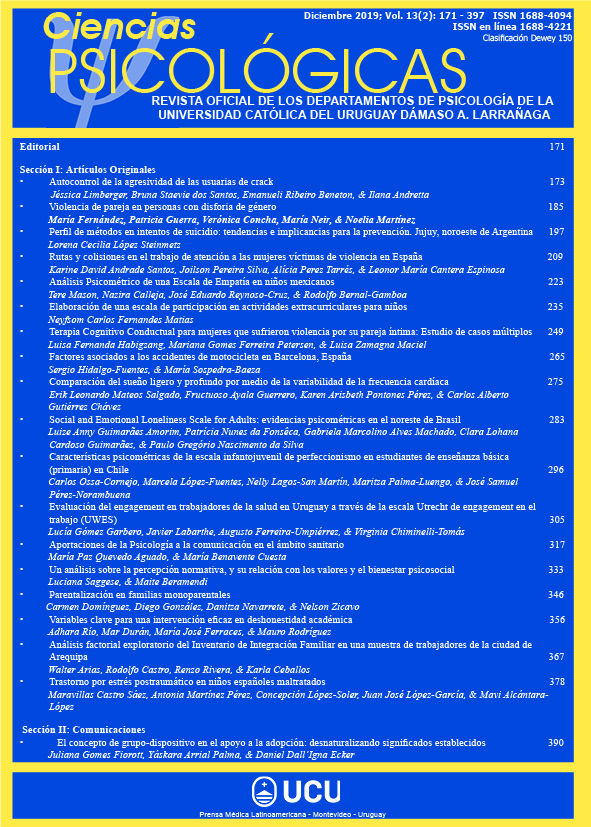Parentalización en familias monoparentales
DOI:
https://doi.org/10.22235/cp.v13i2.1891Palabras clave:
parentalización, familia monoparental, tareas del hogar, límites, rolesResumen
En el presente artículo se exponen los resultados de una investigación de tipo cualitativa correspondiente a la actividad de tesis de los autores, realizada a familias monoparentales con jefatura femenina de la ciudad de Chillán (Chile), cuyo objetivo general fue conocer la percepción que tienen las madres de familias monoparentales de la mencionada ciudad, sobre la parentalización como medio para mantener el equilibrio familiar. Con dichas familias se trabajó mediante entrevistas semiestructuradas realizadas a las jefas de hogar e informantes clave, obteniéndose una apreciación de la distribución de los roles dentro del hogar y, de esta manera, una mayor comprensión de cómo el fenómeno de la parentalización logra ser una herramienta de utilidad para cada sistema familiar. Dentro de los resultados se puede apreciar como la parentalización responde a la historia personal de los jefes de hogar, así como a las circunstancias ambientales a las que se enfrentan las familias o enfermedades de los miembros de estas.
Descargas
Citas
Barudy, J. (2009). Los buenos tratos a la infancia: parentalidad, apego y resiliencia. Barcelona: Gedisa.
Blazek, M. (2016). Parental attitudes and parentification of children in families with limited parental care competencies. Polish Journal of Applied Psychology, 14(3), 93-107. Doi:10.1515/pjap-2015-0064
Boszormenyi-Nagy, I. y Spark, G. (2013). Invisible Loyalties: Reciprocity In Intergeueratioual Family Therapy. New York: Routledge
Cáceres, P. (2003). Análisis de contenido cualitativo: una alternativa metodológica alcanzable. Psicoperspectivas, individuo y sociedad. 2(1), 53-82. Recuperado dehttp://www.psicoperspectivas.cl/index.php/psicoperspectivas/article/viewFile/3/3
Corbetta, P. (2007). Metodología y Técnicas de la investigación social. Madrid: McGraw-Gill.
Encuesta de caracterización socioeconómica [CASEN]. (2015). Hogares y bienestar: Análisis de cambios en la estructura de los hogares (1990-2015). Recuperado de .http://observatorio.ministeriodesarrollosocial.gob.cl/documentos/Panorama_Casen_ 2015_Hogares_y_bienestar.pdf
Engelhardt, J. (2012). The Developmental Implications of Parentification: Effects on Childhood Attachment. Graduate Student Journal of Psychology. 14, 45-52. Recuperado de:htttps://www.tc.columbia.edu/publications/gsjp/gsjp-volumes- archive/gsjp-volume-14-2012/25227_Engelhardt_Parentification.pdf
Espina, A., Pumar, B. (1996). Terapia familiar sistémica: teoría, clínica investigación. España: Fundamentos.
Fondo Internacional de Emergencia de las Naciones Unidas para la Infancia [UNICEF, por sus siglas en inglés]. (2000). Maltrato infantil en Chile. UNICEF responde.
González, M. (2002). Aspectos éticos de la investigación cualitativa. Revista Iberoamericana de Educación, (29), 85-103.
Henríquez, G. y Barriga, O. (2005). El Rombo de la Investigación. Cinta de Moebio, (23), 162-168. Recuperado de http://www.facso.uchile.cl/publicaciones/moebio/23/henriquez.htm
Hooper, L. M., L'Abate, L., Sweeney, L. G., Ganesini, G. y Jankowsk, P. J. (2013). Models of Psychopathology: Generational Processes and Relational Roles. New York: Springer.
Hooper, L. y Wallace, S. (2009). Evaluating the Parentification Questionnaire: Psychometric Properties and Psychopathology Correlates. Contemporary Family Therapy, 32(1), 52–68. doi 10.1007/s10591-009-9103-9
Instituto Nacional de Estadísticas Chile [INE]. (2017). Censo de Población y Vivienda 2017. Recuperado de http://ine.ine.cl/redbin/RpWebEngine.exe/Portal?BASE=CENSO_2017&lang=esp
Jankowski, P., Hooper, L., Sandage, S. y Hannah, N. (2011). Parentification and mental health symptoms: mediator effects of perceived unfairness and differentiation of self. Journal of Family Therapy, 35(1), 43-65. Recuperado de http://guru.louisville.edu/hooperresearchlab/uploads/1/8/9/9/18990313/37.-journal- of-family-therapy-2012.pdf
Jurkovic, G. J. (1997). Lost Childhoods: The Plight of the Parentified Child [Infancias Perdidas: La difícil situación del niño parentalizado]. Nueva York: Brunner- Routledge.
Moreno, A. (2015). Manual de Terapia Sistémica. Bilbao: Desclée de Brouwer.
Quintana, A. (2006). Metodología de investigación científica cualitativa. En A. Quintana y W. Montgomery (Eds.). Psicología: Tópicos de actualidad. Lima: UNMSM.
Ramírez, M. (2005). Padres y desarrollo de los hijos: Prácticas de crianza. Estudios Pedagógicos XXXI, 31(2), 167-177. Recuperado de https://scielo.conicyt.cl/scielo.php?script=sci_arttext&pid=S0718- 07052005000200011
Rodriguez-Gonzalez, M. y Martínez, M. (2015). La teoría familiar sistémica de Bowen: avances y aplicación terapéutica. Madrid: McGraw-Hill.
Selvini, M; Boscolo, L., Cecchin G. y Prata G. (1991). Paradoja y contraparadoja. Buenos Aires: Paidós
Universidad de Chile y World Vision (2018). Modelos Culturales de Crianza en Chile: Castigo y ternura, una mirada desde niños y niñas. Chile. Recuperado de https://www.worldvision.cl/modelos-culturales-de-crianza-en-chile?hsCtaTracking=18b52918- db23-402d-9217-f724ef103c2c%7Ce945d4ca-f512- 4948-9164-6eaa62b65390
Williams, K. (2010). Examining the Construct of Childhood Parentification: An Empirical Investigation. (Tesis de maestría). Memorial University of Newfoundland, St. John. Recuperado de https://core.ac.uk/download/pdf/33557476.pdf
















